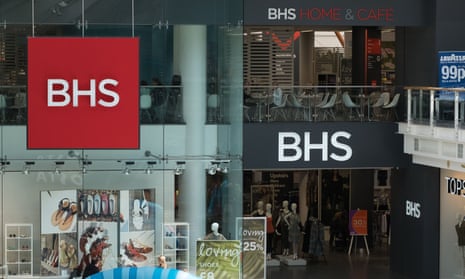Almost 11,000 high street jobs are at risk with BHS set to fall into administration on Monday morning unless a last-minute rescue deal can be agreed with Mike Ashley’s Sports Direct.
The collapse of the department store chain will be the biggest failure on the high street since the demise of Woolworths in 2008, providing the government with another headache as it attempts to save thousands of jobs in the steel industry.
BHS has failed to secure emergency funding that it needed to pay wages and its rent. The restructuring firm Duff & Phelps is set to be appointed as administrators on Monday, unless £60m can be found to keep BHS afloat in the short term.
Darren Topp, the chief executive of BHS, said: “What was on the table wasn’t sufficient and we have been working in the last few days to fill the gap.”
Dominic Chappell, the owner of BHS, held talks all weekend with Mike Ashley’s Sports Direct about the sportswear retailer buying the ailing department store chain. However, Sports Direct is thought to be concerned about BHS’s debts and its pension deficit.
In the absence of a rescue deal, BHS staff will be told about the collapse of the company at a meeting at 11am on Monday morning. The administrators will try to find a buyer for the company as a going concern.
The collapse of BHS will lead to criticism of Chappell and Sir Philip Green, the billionaire tycoon who sold the business for £1 in last March 2015
Usdaw, the trade union for shopworkers, said it was very concerned for the future of BHS, which has 164 stores. David Gill, the Usdaw national officer, said: “We are seeking urgent clarification from the company and urging them to change their attitude to trade unions and begin a dialogue with us at this difficult and worrying time for staff.”
The demise of BHS comes just a month after it appeared to secure its short-term survival by persuading landlords to cut the rent it pays by up to 75% at 87 shops. However, even as landlords, suppliers and creditors voted overwhelmingly in favour of the survival plan, known as a company voluntary arrangement (CVA), BHS warned that it need to find £100m to continue trading.
The chain was founded as British Home Stores in 1928 by a group of American entrepreneurs who wanted to create a UK version of Woolworths. The first shop was in Brixton, south London.
Green, the retail tycoon, bought BHS for £200m in 2000, turning it into part of his Arcadia empire. Green paid more than £400m in dividends to his wife, Tina, during the early years of his 15-year ownership, but he struggled to revive the brand amid fierce competition on the high street and it remained deep in the red.
The billionaire sold BHS last March, for just £1, to Retail Acquisitions Ltd, a little-known collection of financiers, lawyers and accountants led by Chappell.
Since then, concerns about its future have grown. It emerged that Chappell had been declared bankrupt twice before buying BHS and the Guardian revealed that Retail Acquisitions had taken an £8.4m loan out of BHS in the days after it bought the business. Retail Acquisitions claimed the loan was for “professional fees”, although more than a third went to members of the consortium.
It is understood that the relationship between Chappell and the management of BHS and Green has broken down in recent weeks. Green is a major creditor to BHS after lending the retailer money when he sold it.
The £100m that BHS needed to raise was supposed to come from the sale of £30m of property, a new £60m loan from private equity firm Gordon Brothers and £10m from the changing the terms of its agreement with suppliers. On top of this, however, it needed to raise another £70m from selling property to pay off a separate loan from Grovepoint. This would allow it to sell property secured against the Grovepoint loan.
However, the retailer has failed to raise enough money from its property and the deal with Gordon Brothers has fallen apart.
BHS raised just £52m from the sale of its shop on Oxford Street in London and a branch in Sunderland, leaving it well short of its funding target. It had hoped to raise £70m from selling Oxford Street and the rest of the money by selling eight shops to Sports Direct.
With the business running out of cash, Gordon Brothers is understood to have offered strict terms on a loan, including upfront fees and less money than initially hoped. Talks with Gordon Brothers were already complex because Green needed to release security he held over BHS’s assets in order for the loan to go through.
Green is understood to have been ready to agree to the loan, but the funds from Gordon Brothers were not enough without the property deals and the strict terms led to the talks collapsing.
Separately, Green has held talks with the Pension Regulator about injecting cash into the company’s pension scheme. He is thought to have offered £40m in cash and a £40m loan secured against BHS’s assets.
